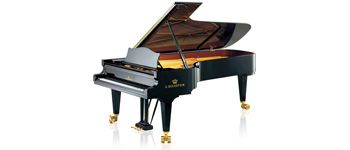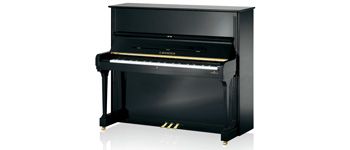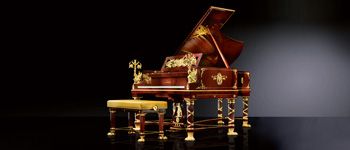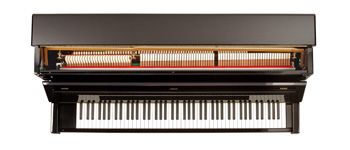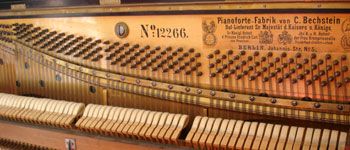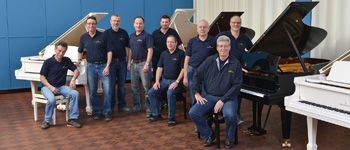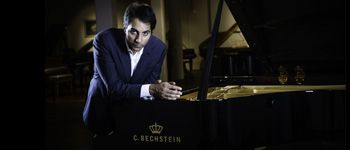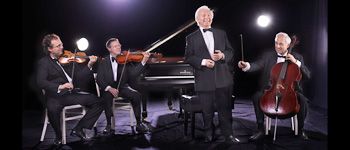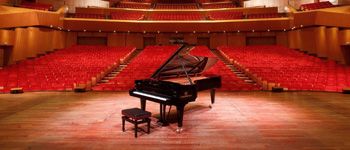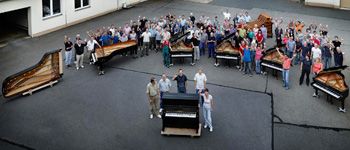Bechstein-Tradition
Highest quality since 1853. Browse through the history of our company.
Piano global
However, 2003 is also the year of a change in the company’s ownership structure. In September 2002, the South Korean musical instrument manufacturer Samick contacted Bechstein and suggested a collaboration between both businesses. This was not surprising as Samick had founded a joint venture with Baldwin in 1983, the Korean-American Musical Instruments Corporation, which produced 66,000 instruments the following year. After a restructuring performed in 2002, Samick has now a staff of three thousand, runs production facilities in Seoul, Djakarta and Shanghai, and manufactures 50,000 upright and grand pianos a year, as well as numerous electronic pianos and half a million guitars. Moreover, the subsidiary Samick America markets the instruments successfully in the US.
According to a contract that takes effect in January 2003, Samick acquires Bechstein shares while Karl Schulze and his wife Berenice Küpper participate in Samick’s capital. This co-operation enables the traditional Berlin company to produce the low-segment instruments in Asia and acquire components for the mid-segment pianos at attractive prices, whereby the quality of such components is constantly monitored. Samick, on the other hand, benefits from the prestigious aura of the great German brand. Another asset of the new co-operation is the opening of a showroom in Korea: Seoul’s Bechstein Center.
C. Bechstein International Piano Competition
Bechstein’s 150th anniversary was an opportunity to celebrate, but the upsets of the world economy made it impossible to perform a detailed review of the company’s glorious past. Three years later, in 2006, Bechstein resolutely faces the future as it institutes the C. Bechstein International Piano Competition and decides to repeat the event every fourth year. The first edition is held at venues in the Ruhr region: Duisburg’s Theatre, Dortmund’s Konzerthaus, Essen’s Philharmonic Hall and Folkwang Conservatory. The competition is placed under the patronage of pianist and conductor Vladimir Ashkenazy; its artistic director is Boris Bloch, who teaches piano at the Folkwang Conservatory; among the jury members are the pianists Idil Biret and Kyrill Gerstein, as well as the composer Alexander Tchaikovsky, artistic director with Moscow Philharmonic Society.
The event is immediately well received by the public, as 250 young pianists from fifty-five countries apply — which is quite unusual for a new competition. Berenice Küpper, Bechstein’s sales manager and experienced pianist, who initiated the competition, is satisfied: such a success shows that the name “Bechstein” remains prestigious the world over. After a pre-selection phase, nearly fifty pianists perform during events scheduled over ten days, giving excellent and exciting concerts. Hans von Bülow, the dear friend of the company founder, would most likely have appreciated the programme, as it includes compulsory works by Bach and Beethoven. Moreover, during the semi-finals the candidates must perform a piano concerto by Mozart together with a string quartet to demonstrate their skills as soloists and chamber musicians — a procedure that Mozart himself planned when composing some of his concertos. The first prize is awarded to Evgeny Bozhanov, a young Bulgarian pianist who wins 15,000 euros, a sum that clearly indicates that this competition intends to rank among the main international events from the outset.
New partners
The year 2006 also brings another change in the company’s financial structure because in the previous autumn, Karl Schulze and his wife Berenice Küpper re-acquired half of the shares owned by Samick. Thus Bechstein’s CEO and Marketing Director together hold nearly thirty percent of the company’s capital, so that Samick becomes merely a financial investor with only 19.5 percent of the shares — and without a blocking minority.
The first decade of the 21st century is truly incredible. Future generations will probably consider it the most fast-paced period of human history. The world changes its face every day: Indian magnates take over a European steel group and a traditional British car brand; major Russian energy providers sign delivery contracts with a number of European countries; the media report as much on China as on the US; everybody talks about globalisation, whereby some advocate it while others — in particular NGOs — drastically oppose it. In such a context, running a business requires rapid decision-making to alter the course whenever necessary. A company that invests in a country to take advantage of low personnel costs must sometimes change its mind and withdraw its investment due to political insecurity, general corruption, lack of skills in the workforce or simply increasing transport costs. How can a piano-making company survive under such conditions? How can it produce instruments that last for decades and fascinate pianists over one century or even more?
Europe’s leading piano manufacturer
In the meantime, C. Bechstein has become Europe’s leading manufacturer of upright and grand pianos. The company reaps not only the assets, but also the disadvantages of globalisation. By the end of the first decade of the 21st century, it co-operates with the best suppliers the world over, selected and continuously monitored by a special team. Moreover, Bechstein organises training sessions for the suppliers to ensure that they are able to meet the company’s strict quality specifications. Concerning just the soundboard, for example: the plywood that the supplier delivers for processing by Bechstein must be made of spruce grown in European mountains at a certain altitude; and according to Bechstein’s specifications, it must dry in a climatic chamber for six to twelve months (uprights) or even two years (concert grand pianos). As regards the hammerheads, the drying times are three months for uprights and six months for grand pianos. Such examples show that the just-in-time processes used by businesses serving industry, who transfer their warehouses to lorries that deliver at the very last minute, are not possible at the Bechstein factory, where craftsmanship and handwork still play a crucial role in the production processes.
The taste of music aficionados also changes during the first decade of the 21st century. In Central and Western Europe, as well as in Canada and the US, people increasingly appreciate concerts given on “authentic instruments,” i.e. historic pianos or replicas, whereby the latter are sometimes better. Most of these instruments are unique pieces made by craftsmen. Another change is the increased size of the concert halls in Europe, Russia, Asia and the US. Such venues have special acoustic properties that require powerful instruments with a rich, colourful voice. In all cases, the audience expects an exceptional, glamorous event and is prepared to pay for it.
Another novelty is the growing influence of the Russian school. The trend was already discernible before the implosion of the Soviet Union, and has gained ever since as many young pianists moved to Central and Western Europe. The Russian school’s main characteristic is a vivid and powerful play that strongly contrasts with the “jeu perlé” of the French tradition that still bears the influence of the lute and harpsichord players of the 18th century.
A new concert grand
The new C. Bechstein model D concert grand piano takes these developments into account, as illustrated by the following two examples: while the agraffes of the treble strings were a characteristic of the Bechstein instruments for decades, they are replaced on the model D by capo bars integrated into the cast iron frame; moreover, the new concert grand piano is provided with a duplex scale that increases the vibrating length of the strings, thus improving the instrument’s voice.
This alone would not be sufficient and just as in Carl Bechstein’s day, personal commitment remains paramount. But while the company founder only left Berlin on rare occasions once his business was running, today’s CEO must fly to Moscow if he hopes to sell a concert grand to the city’s opera. Likewise, it is necessary to maintain a constant dialogue with great pianists, whereby major events like the yearly piano festival of La Roque d’Anthéron, in the south of France, provide a good opportunity to do so. Therefore, trips from Berlin to Seoul are just a facet of Karl Schulze’s many outward activities in the first decade of the 21st century.
In late 2008, severe turbulences shake the economic world and their end is not in sight, but at least tariff barriers have practically vanished in Europe by that time, which makes a significant difference to the situation of 1853. Moreover, the downfall of the Soviet Union and the collapse of the Comecon enable the European Union to acquire new member states in Eastern and Southeastern Europe.
Diversification
In this context, Bechstein does not merely produce one model of grand plus one or two models of uprights like in the mid-19th century, but develops a quite comprehensive range of products. Among the reasons for this development are the increasing differences of incomes within the middle classes. We know that most of the piano buyers belong to this social group but should bear in mind that even as Carl Bechstein was working with Kriegelstein in Paris, “popular pianos” were already being built using rationalised production processes.
The Euterpe instruments are such “popular pianos”. The company was founded in Berlin, moved to Langlau after the Second World War and was taken over by C. Bechstein in 1990. Between the mid-1990s and 2003, Bechstein produces the Euterpe upright and grand pianos in co-operation with Petrof, a traditional Czech brand. In a second phase, the instruments are redesigned and produced in Djakarta in co-operation with Samick until 2008. The co-operation with Petrof ends in 2005 because Bechstein has found a new Czech partner the year before: Bohemia, the successor to IFM Piana, a business founded in 1993 — four years after the Velvet Revolution that put an end to Communist dictatorship and led to the split of Czechoslovakia into two independent countries. Bohemia’s headquarters are in Jihlava, a city where a piano factory opened as early as 1871 made instruments in close co-operation with the Vienna brand Hofmann & Czerny until the 1960s. Bohemia rapidly flourishes: it sells nearly three thousand uprights under different brands in the mid-1990s and opens a production site for grand pianos in 1995 in Hradec Kràlové, one-hundred-twenty kilometres north of Jihlava and some hundred kilometres east of Prague.
